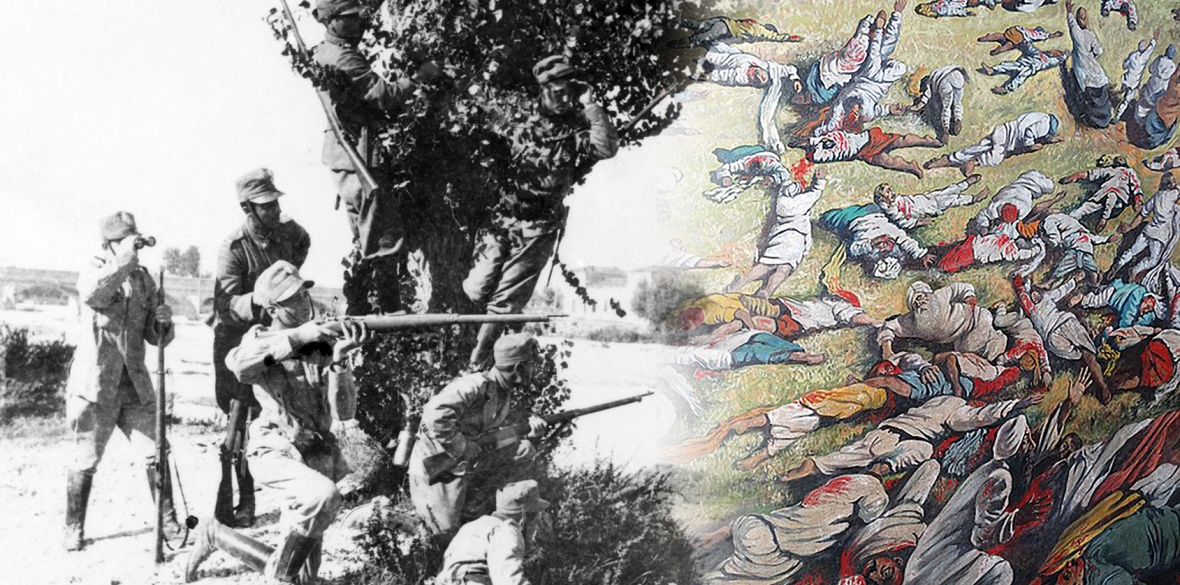This is the last article you can read this month
You can read more article this month
You can read more articles this month
Sorry your limit is up for this month
Reset on:
Please help support the Morning Star by subscribing here
SINCE 1933, people have been trading the red poppy for the white — or worn them side by side — as an act of commitment to peace, to challenge any attempt to justify war and to remember all victims of war, including those whose histories are systematically erased.
Victims of colonial wars are seldom acknowledged during mainstream remembrance, but this Remembrance Sunday the Peace Pledge Union (PPU) is launching a new initiative, Decolonising Remembrance, which is aimed at highlighting how the history of British warfare is inseparable from the history of empire.
During the first world war, millions of colonial troops were mobilised, with Britain recruiting extensively from India and the West Indies, while France enlisted soldiers from west Africa, Algeria, Indochina and beyond.
Germany, too, drew from both east and west Africa. Similarly, during the second world war, colonial forces were vital, with Britain enlisting 2.5 million men from the Indian subcontinent during World War II. As imperial ambitions clashed, these vast territories became battlegrounds for control over land and resources, with deep human consequences.
The tragic impact of these conflicts cannot be overlooked. From the racist regimes imposed across north Africa to the Bengal famine — overseen by Winston Churchill, who made the egregious decision to divert much needed food resources from India to support the European war effort — these wartime policies resulted in immense suffering. Churchill’s callous neglect led to the deaths of over three million Indians. Yet Churchill continues to be glorified in the nationalist narrative of remembrance, alongside other colonial figures such as Herbert Kitchener and Arthur “Bomber” Harris.
Mainstream remembrance also obscures the pervasive discrimination of colonial soldiers both during and after the wars. In 1944, French west African veterans who had been liberated from German POW camps sought equal pay and demanded their unpaid wages. In a stunning act of repression, French commanding officers turned their guns on their own men, murdering nearly 300 veterans.
Recent remembrance efforts to address these historical injustices have barely scratched the surface. In Britain, a 2021 inquiry by the Commonwealth War Graves Commission revealed a shocking legacy of racism that has led to the unequal commemoration of black and Asian war dead; an estimated 116,000, and potentially up to 350,000, predominantly African and Middle Eastern casualties of the first world war remain uncommemorated.
Beyond the world wars, the significant colonial conflicts of the Inter- and post-war periods often remain unacknowledged too. Major British war crimes — including widespread torture during the Mau Mau Emergency in Kenya, the Jallianwala Bagh massacre in India, chemical warfare in Malaya, and collective punishment in Mandatory Palestine — are often left out of public discourse, glossed over as obscure, uncomfortable pages in British history.
Thus Remembrance Day should be a time for reflection on the full human cost of war and colonial conflicts, both past and present.
“History didn’t start on October 7,” has become a powerful rebuttal used by the Palestinian cause to highlight the extent of Israel’s oppression of Palestinians, which was enabled by British imperialism. The Sykes-Picot Agreement, signed two years into World War II, divided the former Ottoman Syria, along Western perceived sectarian lines, between the Allied Powers. When the war ended, Britain was handed full control over Palestine until 1948.
Under its repressive regime, Britain suppressed the Great Palestinian Revolt 1936-39 by imposing collective punishment, and by the end of the revolt, 10 per cent of the adult male Arab population were either killed, wounded, imprisoned or exiled. Britain also installed 13 detention camps, which contained at one point over 9,000 people.
These camps are still used by Israel today to imprison Palestinians without trial which has been facilitated by the Defence (Emergency) Regulations. Originally introduced by Britain in 1945, and later integrated into Israeli law, these set of regulations enable the state’s repression and dispossession of Palestinians, authorising land confiscations, house demolitions, deportations, warrantless searches and arrests, administrative detentions, movement restrictions, surveillance, censorship, the outlawing of civil society associations, and the establishment of military courts.
Many Britons struggle to comprehend how the British government continues to provide “unconditional support” to the state of Israel amid its ongoing genocide of Palestinians. However, the situation unfolding in Gaza highlights a troubling historical trend in Britain’s post-colonial foreign policy.
In an effort to maintain close ties with its former colonies and secure access to their resources — often at the cost of human rights — Britain has a history of supporting oppressive regimes. From arming Nigeria during its genocidal campaign against Biafra from 1967 to 1970, to backing Iraq during its brutal campaign against the Kurds in 1963.
Evidently, the histories of colonialism and the global military-industrial complex are deeply intertwined. Britain, one of the largest arms exporters in the world, has granted arms export licences to Israel worth £576 million in total since 2008. In fact, Israel’s occupation of Palestine has proven highly profitable for the Israeli state and Western allies. The market value of Israeli weapons manufacturer Elbit Systems has surged as have the shares of US military contractor Lockheed Martin.
Decolonising Remembrance is an active practice, and this year, the PPU marched alongside hundreds of thousands of people calling for a ceasefire and an outright ban on British arms sales to Israel. At the PPU’s National Alternative Remembrance Ceremony, voices such as Palestinian curator and researcher Nadine Aranki and British Palestinian peace studies scholar Marwan Darweish contributed to the conversation on decolonisation, which ultimately seeks to foster a future free from violence and oppression for everyone.
Decolonising Remembrance is an ongoing project, so we welcome input from others, including PPU members and supporters. If you would like to contribute or help us improve this work, please get in touch at mail@ppu.org.uk.







